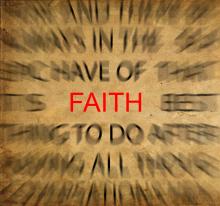Letter to the Editors
Departments

A NEW CALENDAR YEAR marks the end of the Christmas season and a shift to the season of Epiphany that spotlights the reality of the Incarnation. In sync with our personal promises to discontinue bad habits in favor of better practices, the lectionary readings capture familiar expressions of vocational clarity and ministerial frustration. The season is a mosaic of self-examination peppered with moments of great light penetrating the darkest despair. Whether ancient Israel (living in exile in the sixth century B.C.E.), the followers of Jesus (in the first century C.E.), or 21st century seekers of spirituality without religion, the description is the same: The disenfranchised, disappointed, and divided discover a glimpse of the reign of God.
Read these texts as snippets of ancient social media: status updates of a prophet, blogs about the ministry of Jesus, and PDF files about early church practices. Each exposes the light of God pushing into the darkness of human existence: frustrated ministers, radical promises of forgiveness, reports of flourishing charismatic leaders, stalemated efforts due to divided affiliations, petitions for lawmakers to practice impartiality, and the death of one imprisoned on suspicious testimony. Familiar, jarring, and too often tamed, these texts deserve at least the attention afforded public policy debates and celebrity rumors.
A close reading of the text does not lend safety by avoiding the prophet, ignoring John’s message, or disputing baptism rituals. Every baptized believer is called to arise and live as if the kingdom of God has come.

A PROFOUND SENSE of expectation launches a new year. As the season of Advent commences the Christian year, just weeks before the turn of the calendar year, familiar biblical stories invite us to begin again by glimpsing the coming reign of God. Weekly worshippers and annual attendees gather for the season premiere of the greatest story ever told. A promise. A vision. A hope. Great expectation.
The ancient prophet, psalm, gospel, and epistle together extend to the contemporary preacher words of unflinching hope that emerge fresh from the rubble of turmoil, trial, and tribulation of every God-seeking generation. Today’s words of hope must also descend like the savory aroma of a holiday meal, promising solace to the harmed, heartbroken, and hindered.
Familiarity with the Advent and Christmas narratives may leave us unaware of the radical expectation and potential impact that reciting these events can bring. These readings offer an arresting narrative of divine presence inaugurating an unprecedented commonwealth from among the divided nation. The vision makes no sense if it does not offer an alternative to the existing promises of “life, liberty, and the pursuit of happiness.” The narrative challenges us to understand that our celebration of the birth of Jesus is not shiny lights or a musical presentation. It anticipates the arrival of goodness signaling an end to corruption and gloom. This global holiday extends the drama narrated in Christian scripture as each generation must wrestle again with the contemporary relevance of the birth of Jesus.

The clouds, pregnant with rain. No light
but an inkling of light. If Advent is a time
of waiting, of joyful anticipation, why are we
so often troubled? Consider Mary, the unknown
future she holds. Or Amy, staying the day
with D—, expecting in January, alone and now
spotting with unexpected blood, baby not yet
ready. What was our life before children? Years
of memories now include the children—as if they
already were born, only we could not see them.

And fallen, fallen light renew!
—William Blake
Thou, this humid cloak at dusk, a blue
Air flattened, smoldering the same
Field for years. Oh, Thou—this hardened name
For You not joyously sprung, not grown to grace

THE CELEBRATED PHILOSOPHER Ludwig Wittgenstein used to speak—disapprovingly—of “language going on holiday.” For example, sportswriters often free language from the drudgery of everyday common usage to let it spread its wings in glorious hyperbole about their favorite teams.
Our biblical heritage gives us examples that are much deeper. When we read the prophets especially, we hear language liberated from the constraints of the everyday to give it a sacred vacation, a true “holy-day,” so that it can return to us reinvigorated. We hear them sending language on an adventure holiday into the realm of God’s future. When they receive the words back, the prophets find themselves recounting visions of a new world that God has in store.
Eschatological language that has been to the future and back exerts a powerful authority over us. In this month’s scriptures we experience that authority again in Isaiah’s unforgettable oracles about the holy mountain on which no one shall ever again hurt or destroy. We shall see, with our mind’s eye, the rising of the sun of righteousness with healing in its wings. We shall hear Jesus speaking of the life waiting for the children of the resurrection. The church’s year ends by inviting us to enter under the authority of the coming kingdom, to become fluent in its strange language of hope, harmony, and ultimate reunion with the Holy One who has reconciled all creation through the cross and resurrection.

JEREMIAH IS OUR uncomfortable and discomfiting companion this month. He is a vehemently emotional man of God. Far from struggling to bring his emotion under control, he instead prays for more raw grief and anger. He knows that even his current rage and tears in no way match the scale of devastation wreaked by unfaithfulness to God’s covenant. “For the hurt of my poor people I am hurt, I mourn, and dismay has taken hold of me. Is there no balm in Gilead? Is there no physician there? Why then has the health of my poor people not been restored? O that my head were a spring of water, and my eyes a fountain of tears, so that I might weep day and night for the slain of my poor people!” (8:21 - 9:1). To be a prophet is to risk letting our hearts resonate with the feelings of God. Jeremiah might help us discern whether our own witness for justice has turned into something too rational, measured, even routine. How do we re-engage our hearts and derive our passion from God’s divine passion?
Luke’s deep concern to show Jesus’ prophesying against the toxicity of Mammon, the power games of the wealthy, is ablaze in the gospel readings. Perhaps those who read them to us in church should preface them with a warning along the lines of Bette Davis’ famous quip in All About Eve: “Fasten your seatbelts. It’s going to be a bumpy night!”

WHICH SCRIPTURES WILL our biases tempt us to sidestep this month? Perhaps 2 Timothy? Not usually the favorite of radicals. Whether actually written by Paul just before his death or worked up later by followers, the letter has a certain poignancy, suggesting the waning of Christianity’s pioneer phase. The church is in for the long haul. Its faith needs to find forms that can be transmitted across generations. It needs patient leadership that will be consistent in the face of inauthentic mutations of the gospel, religious imposters, and the distraction of futile controversies—hence the emphasis on sound teaching, the internalized treasure of the creed.
Let’s honor this recognition within scripture itself that the gospel needs institutions. The church must even risk banality in some of its teaching practices. A great interpreter of the Christian mystical tradition, Friedrich von Hügel, invites us to respect the way radical teachings have to be given forms that can be handled by regular folks, not geniuses. “Is there not a pathetic instruction in watching the insertion of the copper alloy into the pure gold ... that is, a metal sufficiently resistant to the clumsy handling of the multitude to be able to persist in the transmission of a value, and indeed a precise value, even though it be not the highest. There is surely a pathos here most thoroughly characteristic of the abiding limitations and homely needs of our poor humanity.”
Bio: "Khaipi" (real name withheld) is a peace studies professor in Thailand and a Chin religious freedom activist who served as researcher for the Chin Human Rights Organization's 2012 report detailing abuses against ethnic and religious minorities in Burma.chro.ca
1. What is at the root of the persecution of Christians in Burma?
There is an unwritten policy called “Burmanization,” which means that to be Burmese you have to be a Buddhist and you have to speak Burmese. The Chin people are not allowed to practice Christianity, and we are not allowed to study our own ethnic languages. But it’s not all about religion: They are attacking our ethnic identity because Christianity has become our identity.
Before Christianity came to the Chin people, they practiced an indigenous religion. In this religion, they believed in an Almighty One who created the world. In 1899, the very first American Baptist missionaries came to Chin state, and when they talked about the Christian God, our forefathers could adopt it very easily because it was very close to that indigenous belief. Today, when the Burmese military junta persecutes us, they say, “Okay, we want to take out this kind of Western religion.” But for us, once we believed in God, it became our religion, not a Western religion anymore.